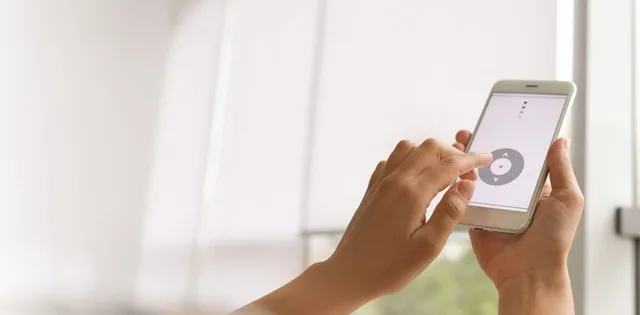Understanding Smart Home Integration
The concept of a ‘smart home’ has burst forth, with an ecosystem of interconnected devices that harmonize to provide both comfort and functionality and an aesthetically pleasing ambiance. Within this cutting-edge technology network, intelligent motorized blinds play a pivotal role; they offer fine-tuned control over natural light and privacy, central to modern design and sustainable living principles.
Integrating smart devices such as motorized blinds and shades is more than a luxury; it is a thoughtful approach to living that brings about energy conservation and improved well-being. Automatically adjusting to daylight changes, these blinds help balance artificial and natural lighting, increase privacy at necessary times, and even work as a thermal insulator, preserving the ideal temperature in your sacred spaces. These features collectively contribute to significant energy savings and a greener footprint on Earth. These intelligent shades become crucial in thoughtful living by enabling seamless connectivity with your existing home automation systems.
Selection Criteria for Smart Blinds
To automate your home, start by installing motorized blinds and shades. When choosing the right solution, paying attention to critical factors such as ease of use, reliability, aesthetics, and integration with existing home technology is essential. The blinds’ capability to maintain privacy and enhance home security is an often overlooked yet paramount criterion. With features enabling one to control shades from remote locations, homeowners can simulate presence within the household to deter potential intruders from anywhere at any time. This digital impersonation of occupancy serves as a safety measure and adds a layer of convenience for the user by automating routines aligned with daily schedules.
The Inner Workings of Motorized Blinds
Delving into the mechanics, smart motorized blinds comprise discreet yet powerful motors that can be actuated through many control options. These range from wireless remote controls and programmable wall switches to the latest technology— mobile and web-based applications. The latter opens Pandora’s box of possibilities, allowing fine-grained control over every aspect of the blinds’ operation, creating schedules, and even responding to environmental cues such as the intensity of sunlight. Such sophistication in operation eschews the need for manual intervention and meshes with the lives of those desiring automation and those with accessibility needs. Moreover, including durable materials and mechanical parts in these blinds ensures a long service life with minimal maintenance, a genuine win-win for users.
Installation and Setup Process
When it comes to installing the product that connects purchase and pleasure, users have the option to either do it themselves or hire professional services. With manufacturers providing clear instructions and the necessary tools, enthusiasts can undertake this journey, leading to a greater understanding and familiarity with their device. Nevertheless, professional installation services are invaluable for those who prefer a hands-off approach, saving time and guaranteeing functionality from the outset. It’s paramount that the blinds are set up correctly to function as intended, especially when integrating them into the broader home automation ecosystem. Beyond the installation, the setup also involves calibrating the blinds to work with existing systems and configuring any personal preferences, solidifying the unique user experience these smart devices offer.
Integrating with Smart Home Assistants
In an age where convenience is king, integrating intelligent motorized blinds with home assistants takes user experience to the celestial heights. Harnessing the power of voice control, one can orchestrate the movements of these blinds with simple commands, weaving them into the routine household activities managed by these digital helpers. Users can concoct personalized scenarios that command the blinds to respond to other automated actions, such as dimming the lights for movie night or ensuring privacy during dinner hours, streamlining daily life in a futuristic and comforting manner.
Advanced Features and Customization
Smart motorized blinds are not merely pieces of fabric that separate us from the outside world; they are embodiments of customization, capable of embracing each user’s habits and lifestyle. Through the wonders of modern technology, they come equipped with features such as solar sensors to detect sunlight intensity, thermal sensors to preserve interior temperatures, and timers that adapt the room’s ambiance to the time of the day. As we stride into a world that prioritizes personalization, the adaptability of these blinds to each individual’s preferences underscores the profound capabilities of modern home automation.
Cost-Benefit Analysis
The cost associated with integrating such technologies into one’s domicile is a vital consideration. Although the upfront cost of smart blinds may appear significant, a comprehensive analysis reveals a long-term view of savings through reduced utility bills, potential tax incentives for energy-efficient home improvements, and the prospect of boosting property value. These economic implications, alongside the qualitative benefits of convenience, security, and well-being, round off a compelling argument for investment.
Future Trends in Smart Home Automation
Casting an eye forward, the automaton saga of our homes is witnessing ceaseless innovations. Predictions for the future of smart home automation hinge on advancements in artificial intelligence, machine learning, and the Internet of Things (IoT), all poised to refine and expand the capabilities of devices like smart blinds. Notions such as blinds autonomously adjusting to the homeowners’ daily patterns or aligning with circadian rhythms are on the horizon, underscoring the impact of these developments on future living.

